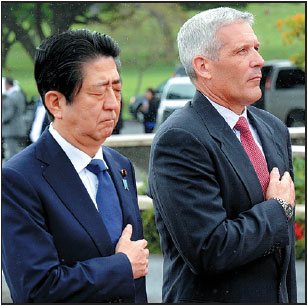Abe visit to Pearl Harbor a political 'show'
Japanese Prime Minister Shinzo Abe, who is on a trip to Pearl Harbor but has no plan to apologize for the World War II surprise attack that killed 2,400 Americans, should sincerely reflect on his country's war crimes rather than just "put on a show", a Chinese Foreign Ministry spokeswoman said on Tuesday.
"Can a so-called victim-consolation trip to Pearl Harbor completely wipe away World War II history? I am afraid it's just wishful thinking on his part," spokeswoman Hua Chunying said at a regularly scheduled news conference.
Abe was scheduled to visit the site of the 1941 attack in Hawaii, which drew the United States into World War II.
Abe visited several memorials on Monday. He and US President Barack Obama were to lay a wreath at the USS Arizona Memorial before speaking at a military base on Tuesday.
Analysts said that Abe's real purpose is not to reflect on Japan's war crimes, but to enhance its alliance with the US, which could undergo stark changes after Donald Trump becomes president next month. Trump has voiced opposition to the proposed, US-led Trans-Pacific Partnership trade pact, including Japan as a member. Trump also has threatened to force allied countries to pay more to host US forces.
Pointing out that the main Asian battlefield of the World Anti-Fascist War was in China, Hua said that Japan "could not turn the page of history" without reconciliation with Asian victim countries including China.
"Just like people in the US will not forget the attack on Pearl Harbor, the Chinese people will not forget the nation's immense sacrifice as well as the compatriots victimized by the Nanjing Massacre," Foreign Ministry spokesman Lu Kang said this month. More than 300,000 people were killed by Japanese troops from December 1937 to January 1938 during the massacre.
On Sunday, 53 eminent US and Japanese people, including US filmmaker Oliver Stone and University of Tokyo professor Tetsuya Takahashi, sent an open letter to Abe to ask whether he planned to pay tribute to victims of Japan's wartime aggression in other nations.
"Will you also be visiting China, Korea, other Asia-Pacific nations, or the other Allied nations for the purpose of 'mourning' war victims in those countries who number in the tens of millions?" the letter said.
Gao Hong, a senior researcher in Japan studies at the Chinese Academy of Social Sciences, said Abe's trip is meant to gain political interests rather than "mourning the victims, as he is labeling it".
Gao said that through such diplomatic moves, Abe hopes to unload Japan's burden of World War II history and turn the page on Japan's atrocities during the war, he said.
Peter Li, a professor at the University of Houston, said that Abe's visit to Pearl Harbor is meaningless unless he recognizes Japan's war crimes.
Describing Abe's refusal to apologize for the attack on Pearl Harbor as "not surprising", Li said, "this refusal to admit Japanese crimes against humanity has been shown in Tokyo's policy toward Asian countries that were victims of Japanese aggression."
"This refusal to admit crimes was also demonstrated in its denial of the use of Asian women as 'sex slaves' for the Japanese army and its denial of its war crimes in Nanking, China," he said.
anbaijie@chinadaily.com.cn
|
Japanese Prime Minister Shinzo Abe and James Horton, director of the US National Memorial of the Pacific, observe a moment of silence on Monday.Hugh Gentry / Reuters |



















